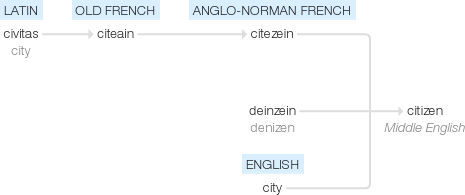Citizen
Middle English: from Anglo-Norman French citezein, alteration (probably influenced by deinzein ‘denizen’) of Old French citeain, based on Latin civitas ‘city’ (see city).
wiktionary
From Middle English citeseyn, citezein, borrowed from Anglo-Norman citesain(“ burgher; city- dweller”), citezein &c., probably a variant of cithein under influence of deinzein(“ denizen”), from Anglo-Norman and Old French citeain &c. and citaien, citeien &c. (" burgher"; modern French citoyen), from cité (" settlement; cathedral city, city"; modern French cité) + -ain or -ien(“ -an, -ian”). See city and hewe.
etymonline
citizen (n.)
c. 1300, citisein (fem. citeseine) "inhabitant of a city or town," from Anglo-French citesein, citezein "city-dweller, town-dweller, citizen" (Old French citeien, 12c., Modern French citoyen), from cite (see city) + -ain (see -ian). According to Middle English Compendium, the -s-/-z- in Anglo-French presumably replaced an earlier *-th-.Old English words were burhsittend and ceasterware.
Sense of "freeman or inhabitant of a country, member of the state or nation, not an alien" is late 14c. Meaning "private person" (as opposed to a civil officer or soldier) is from c. 1600. As a title, 1795, from French: During the French Revolution, citoyen was used as a republican alternative to Monsieur.
Citizen's arrest, one carried out by a private person, without a warrant, allowable in certain cases, is recorded from 1941; citizen's band (radio) from 1947. Citizen of the world (late 15c.) translates Latin civem totius mundi, Greek kosmopolites.
He is not a citizen who is not disposed to respect the laws and to obey the civil magistrate; and he is certainly not a good citizen who does not wish to promote, by every means in his power, the welfare of the whole society of his fellow-citizens. [Adam Smith, "Theory of Moral Sentiments"]
